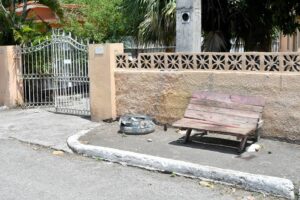
NCB Financial shuffling billions amid new strategy
NCB Financial Group Limited (NCBFG) is moving billions around its subsidiaries as it gears up for a multi-billion-dollar debt bill in 2024 while it focuses on the new direction set by chairman and majority shareholder Michael Lee-Chin which has seen dividends take top priority.
These details were revealed in its recently released 2023 audited financial statements where it was highlighted that $10.82 billion worth of assets were paid by some subsidiaries to National Commercial Bank Jamaica Limited (NCBJ), which in turn declared those proceeds as dividends to NCBFG. This was executed by those NCBJ subsidiaries declaring dividends and engaging in share buy-back transactions, which were settled by a combination of cash, transfer of investment securities and property. A share buy-back in this context would involve the NCBJ subsidiaries purchasing ordinary shares from its direct parent company which would receive cash for the transaction.
NCBFG is a holding company that relies on its subsidiaries to pay management fees and dividend income to not only settle its operating expenses and debt obligations, but also for the firm to pay out dividends to its shareholders. Thus, while NCBFG might have reported $15.34 billion in consolidated net profit in 2023, not all of that economic activity will end up in its direct bank account to pay shareholders larger dividends.
In the case of the subsequent event, NCB Cayman Limited, a Class-A bank in the Cayman Islands, paid $5.41 billion worth of assets. NCB Capital Markets (Cayman) Limited paid $4.56 billion, NCB Capital Markets Limited (NCBCM) paid out $696.10 million and NCB Merchant Bank (Trinidad and Tobago) Limited paid out $154.70 million. This capital upflow would have enabled NCBFG to pay dividends to its shareholders.
These activities were then proceeded by the declaration of a $0.50 dividend by NCBFG on November 17, which was subsequently paid out on December 18. The payment totalled $1.27 billion with all these developments occurring in NCBFG’s first quarter (Q1) or after its 2023 financial year (FY) which ended on September 30.
NCBFG, the stand-alone holding company, recorded a 57 per cent increase in its management fee charged to NCBJ, to the tune of $5.50 billion. Apart from a drop in the foreign currency losses, NCBFG saw a monumental jump in its dividend income from $1.23 billion to $15.51 billion. However, it should be noted that NCBJ declared a special interim dividend of $11.14 billion in June 2023, with $9.77 billion as a non-cash dividend since this nominal amount was re-invested back into NCBJ for ordinary shares at a price of $65.235. This meant that the dividend income received as cash from NCBJ and NCB Global Holdings Limited, the direct parent company of Guardian Holdings Limited (GHL), was $5.73 billion. The proportion of dividend income received from subsidiaries in 2023 is unknown. 96 per cent of NCBFG’s $1.23 billion in dividend income for 2022 was from NCBJ despite GHL paying TT$100.20 million (J$2.35 billion) to NCB Global.
Of the $93.51 billion in other borrowed funds/debt on NCBFG’s books, $36.84 billion is deemed as current to be paid in the next year. 51 per cent of this debt is currently denominated in United States dollars (USD) while the remaining balance is in Jamaican dollars (JMD). $4.11 billion was due in the Q1 and $39.39 billion due by September 2024 based on the liquidity risk notes. Most of this debt originates from the acquisition of Clarien Group Limited and GHL in the past, which cost NCBFG $8.09 billion in interest expense during 2023.
While US$35.47 million (J$5.46 billion) of the current debt is due to NCB Global Holdings by March 2024, the remaining balance of $31.37 billion is payable to other external borrowers. According to the notes, NCBFG borrowed US$75 million from FirstCaribbean International Bank (Trinidad & Tobago) Limited in May 2023 with a balloon payment of US$12.50 million due by May 2024. It should be noted that GHL pays out Trinidad & Tobago dollars (TTD) dividends to shareholders based in the twin island republic and other currencies to shareholders in different jurisdictions. Trinidad has been experiencing challenges with foreign exchange availability with
The related party notes highlighted that $33.07 billion or 35 per cent of the overall debt is owned by subsidiaries and companies controlled by the majority shareholder.
With this incoming debt bill, it begs the question as to not just refinancing, but also to the potential equity fundraising to deal with the upcoming maturities which range from 6.00 – 8.00 per cent in JMD and 5.00 – 8.50 in USD. Despite NCBJ receiving a credit rating upgrade by S&P Global Ratings and Caricris, interest rates across the market remain relatively elevated compared to 2019 levels with NCBFG raising debt in July at 10.75 per cent.
Although Lee-Chin noted that NCBFG would be saving $6-8 billion annually through the reduction in executive compensation, consultancy fees and front-loading on digital innovation, the ongoing dividend payments means some earnings will not be available to these debt repayments. It is still unknown as to how much dividends from GHL are reaching NCBFG’s direct bank account while NCBJ will be dealing with changes to its regulatory capital in 2024. Clarien has not paid dividends to NCBFG since being acquired in December 2017.
NCBFG got approval at its extraordinary general meeting (EGM) to issue 300-450 million new ordinary shares in an additional public offering (APO). An APO allows a company to issue new shares to existing shareholders and the public while it receives cash for its own plans. Company secretary Dave Garcia noted that the publication of NCBFG’s audited numbers and market conditions would factor into when this offer would be executed. NCBFG’s share price closed 2023 at J$66.18/TT$3.40, which leaves it with not only a market capitalisation of J$168.35 billion, but down more than 17 – 25 per cent in 2023.
NCBFG traded at $208.79/TT$11.50 in 2019 with the various announcements seeing the price swinging like a pendulum in the last six months. The pricing of the APO will be critical to ensuring that investors aren’t unnecessarily diluted but also gives NCBFG the take-up it desires in order to reduce its debt pile. It should be noted that the NCBFG’s cash balance considerably improved from $280.63 million to $3.02 billion in 2023.
“As we go through the year, you will see more and more of the impact of IFRS 17, but yes, we will outline IFRS 17 in the basis of preparation in the notes to the financial statements for December 2023 so that shareholders will get a better understanding about, and the changes compared to IFRS 4. Generally, what we have seen so far is a reduction at the start, a reduction in profits when we implement IFRS 17 and then we see improvements thereafter,” said recently appointed NCBFG Chief Financial Officer Malcolm Sadler at the November investor briefing regarding the transition between the accounting standards which will see NCBFG’s consolidated earnings looking drastically different in 2024.






















